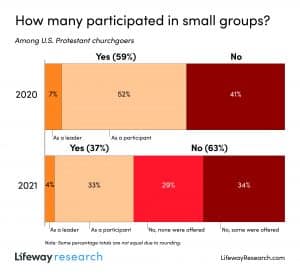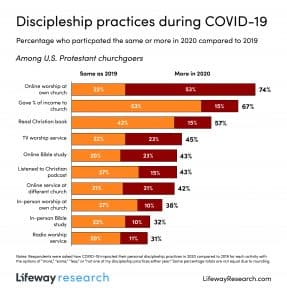
(Lifeway Research) — Fewer churchgoers filled pews and Bible studies during the pandemic, but many still continued personal discipleship habits throughout 2020. A study by Nashville-based Lifeway Research found U.S. churchgoers were less likely to be involved in small groups during the pandemic, but many added some digital and individual activities to their discipleship routines.
“Some have defined discipleship as a journey of following Christ in fellowship with other believers,” said Scott McConnell, executive director of Lifeway Research. “COVID-19 appears to have had both positive and negative impacts on discipleship. Pre-pandemic churchgoers largely have shown more resolve in following Christ over the following year while altering how they engage with other believers.”
Scattered Small Groups
In January 2020, prior to the emergence of the COVID-19 pandemic, around 3 in 5 U.S. churchgoers say they participated in a church small group. Slightly more than half (52%) say they were a participant in such a group, while 7% say they served as a group leader. Another 41% of churchgoers say they were not involved in such a group prior to the pandemic.
Young adults aged 18 to 29 are the most likely to say they were participants in a small group before COVID (68%), while churchgoers 65 and older are the most likely to say they didn’t participate in groups at all (57%). African Americans (62%) are also more likely to say they were participants in a small group in January 2020 than white churchgoers (48%).
 A year later, fewer U.S. churchgoers overall say they were involved in any type of church small groups. A third (33%) say they were participants in January 2021, and 4% say they served as a leader. More than 3 in 5 did not participate, including 29%, because their church didn’t offer any small groups, and 34%, even though their church did offer some.
A year later, fewer U.S. churchgoers overall say they were involved in any type of church small groups. A third (33%) say they were participants in January 2021, and 4% say they served as a leader. More than 3 in 5 did not participate, including 29%, because their church didn’t offer any small groups, and 34%, even though their church did offer some.
Among those who say their church offered small groups in January 2021, around half (52%) say they were involved either as a leader (5%) or a participant (47%). Slightly less than half of those who had the option of small group participation (48%) chose to not be involved.
“Our research has shown that Christians involved in in-person small group Bible studies and Sunday School classes are more likely to exemplify Christlike behaviors of serving those outside the church, sharing the gospel, volunteering within the church, giving, and investing in spiritual disciplines,” said McConnell. “During the pandemic, far fewer churchgoers benefited from these Bible-focused, relational meetings, and only a portion took advantage of online options.”
Discipleship in a Pandemic
Pastors became increasingly worried about discipleship within their churches as the COVID-19 pandemic stretched beyond the summer of 2020, according to analysis of a previous Lifeway Research study.
In the most recent Lifeway Research study, U.S. churchgoers relayed how their discipleship practices changed or not during the pandemic by comparing 2020 with 2019 practices of in-person worship service attendance, online worship service attendance, attending another church’s online worship service, viewing a worship service on TV, listening to a worship service on the radio, attending an in-person Bible study, attending an online Bible study, giving the church a percentage of income, reading a Christian book, and listening to a Christian podcast.
“In nine of these discipleship practices, a majority of churchgoers have participated in the last two years,” said McConnell. “In-person worship and Bible studies saw the greatest declines in frequency, while potential replacements for these saw the greatest increases in participation.”
Most (57%) say, compared to 2019, they attended in-person worship services at their church less often in 2020. Fewer say they attended the same (27%) or more (10%).
In many cases, the lack of in-person attendance was replaced with online worship services, as 53% of churchgoers say they participated in more online services in 2020 compared to 2019. Fewer say they did so the same as 2019 (22%) or less (11%).
Around 1 in 5 churchgoers say the pandemic led them to participate in online worship services from another church more in 2020 than in 2019 (21%). The same percentage (21%) say they were involved in those services the same in both years. For almost half of churchgoers (45%) this was not part of their discipleship practices in either year.
Similarly, 45% of churchgoers say they did not participate in worship services on television in either 2019 or 2020. Less than a quarter say they did so more (23%) or the same (22%) when comparing years. Fewer (10%) say they participated less.
Most (59%) did not turn to the radio in either year for worship services. One in 5 churchgoers (20%) say their participation in radio services in 2019 and 2020 was the same. Around 1 in 10 say they participated more (11%), with slightly fewer (10%) saying they did so less in 2020 than 2019.
For in-person Bible studies with other adults, 33% of churchgoers say they participated less in 2020 compared to 2019. Fewer say they were involved with in-person Bible studies the same (22%) or more (10%). Another 35% say in-person Bible studies were not part of their discipleship practices in either year.
 For those who participated in Bible studies, some may have moved over to an online alternative, as 23% of U.S. churchgoers say they participated in online Bible studies more in 2020 than 2019. One in 5 (20%) say they were involved the same amount both years. Fewer (13%) say their participation decreased in 2020. Close to half (45%) say those online groups were not part of their practices in either year.
For those who participated in Bible studies, some may have moved over to an online alternative, as 23% of U.S. churchgoers say they participated in online Bible studies more in 2020 than 2019. One in 5 (20%) say they were involved the same amount both years. Fewer (13%) say their participation decreased in 2020. Close to half (45%) say those online groups were not part of their practices in either year.
More than half of churchgoers (53%) say they gave a percentage of their income to their church the same in 2020 as 2019, while 15% say they gave more. Around a quarter (23%) say they gave less during the pandemic year. For a tenth of churchgoers (10%), giving a portion of their income was not part of their practice in 2019 or 2020.
Some churchgoers (15%) found more time to read a book on Christian living in 2020 compared to 2019. Around 2 in 5 (42%) say they read the same in those two years. Fewer (13%) say their Christian living book reading decreased in 2020. Three in 10 churchgoers (30%) didn’t read any books of that type in either year.
Listening to Christian podcasts also increased for 15% of U.S. churchgoers in 2020. More than a quarter (27%) say they listened the same amount in 2020 and 2019. Few (9%) listened less. Almost half (48%) say Christian podcast listening was not part of their discipleship practices in either year.
Young adult churchgoers (aged 18 to 29) were among the most likely to say they increased their participation in 2020 in in-person worship services (22%), online worship services from another church (27%), TV worship services (31%), radio worship services (24%), in-person Bible studies (24%), online Bible studies (31%), giving a percentage of income to their church (26%), reading a book on Christian living (27%), and listening to a Christian podcast (31%).
African Americans and Hispanics were also more likely than White churchgoers in most categories to say their participation increased in 2020 compared to 2019.
Despite fewer churchgoers being involved in small groups in 2020 and many discipleship practices decreasing during the pandemic, more than 9 in 10 say they grew closer to God through the events of 2020 (54%) or at least stayed about the same (39%), according to a previous Lifeway Research study.
“Those who were churchgoers before COVID-19 say they are more in-tune with God because of the events of 2020,” said McConnell. “This move reflects what Jesus called the greatest commandment, to love God. During the pandemic, the second greatest command to love your neighbor has often been expressed through social distancing. It will be interesting to see what impact this greater love of God has on relationships with others as those activities restart.”
Aaron Earls is a writer for Lifeway Christian Resources.






